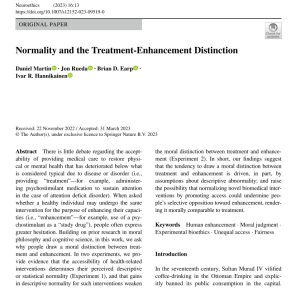Junto con Daniel Martín y Brian D. Earp, nuestros compañeros Jon Rueda e Ivar Hannikainen, han publicado recientemente el artículo «Normality and the Treatment-Enhancement Distinction» en la revista Neuroethics 16, 13 (2023 | https://doi.org/10.1007/s12152-023-09519-0 ). En este texto se plantean las distinciones morales que las personas suelen plantear entre «tratamiento» y «mejora» a la luz de diversos estudios sobre filosofía moral y ciencia cognitiva. Publicamos el abstract del artículo a continuación.
Normality and the Treatment-Enhancement Distinction
Abstract
There is little debate regarding the acceptability of providing medical care to restore physical or mental health that has deteriorated below what is considered typical due to disease or disorder (i.e., providing “treatment”—for example, administering psychostimulant medication to sustain attention in the case of attention deficit disorder). When asked whether a healthy individual may undergo the same intervention for the purpose of enhancing their capacities (i.e., “enhancement”—for example, use of a psychostimulant as a “study drug”), people often express greater hesitation. Building on prior research in moral philosophy and cognitive science, in this work, we ask why people draw a moral distinction between treatment and enhancement. In two experiments, we provide evidence that the accessibility of health-related interventions determines their perceived descriptive or statistical normality (Experiment 1), and that gains in descriptive normality for such interventions weaken the moral distinction between treatment and enhancement (Experiment 2). In short, our findings suggest that the tendency to draw a moral distinction between treatment and enhancement is driven, in part, by assumptions about descriptive abnormality; and raise the possibility that normalizing novel biomedical interventions by promoting access could undermine people’s selective opposition toward enhancement, rendering it morally comparable to treatment.
Puede accederse al artículo aquí.

